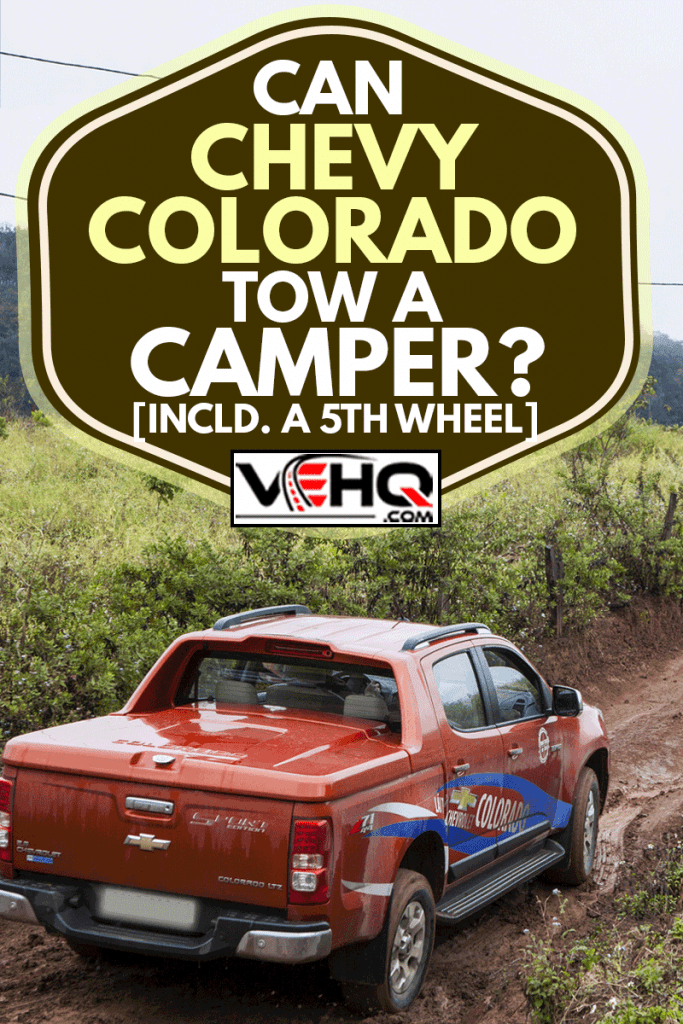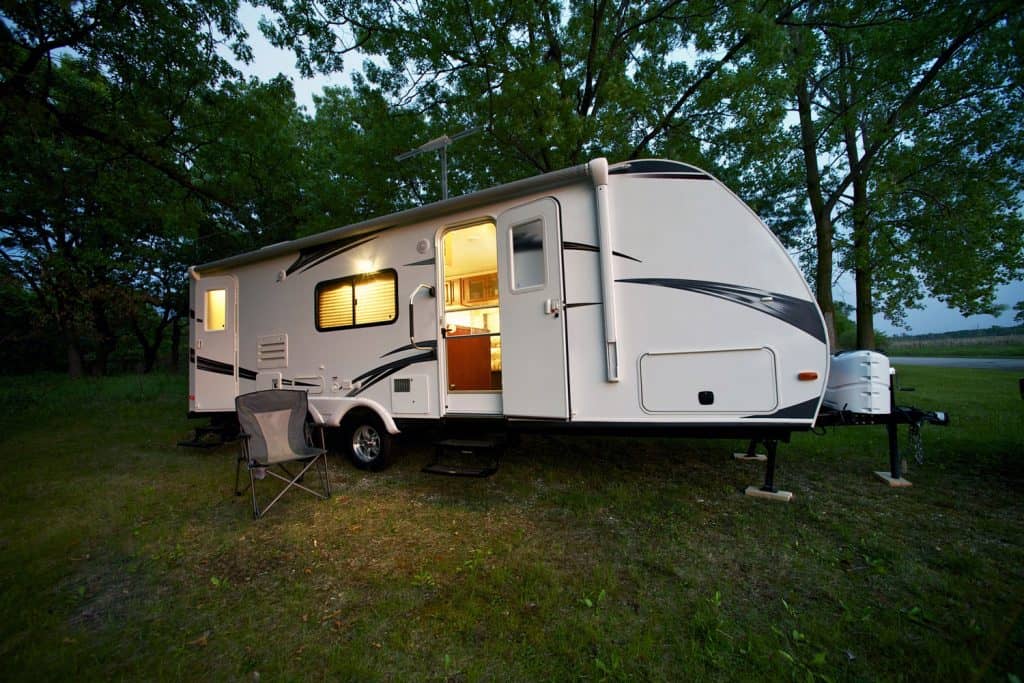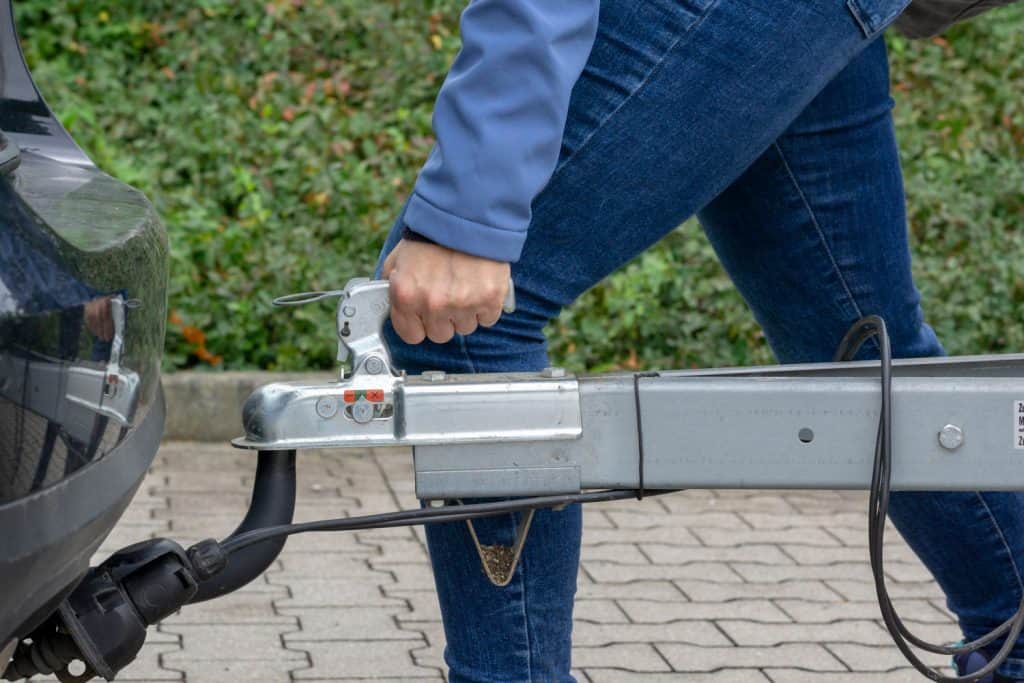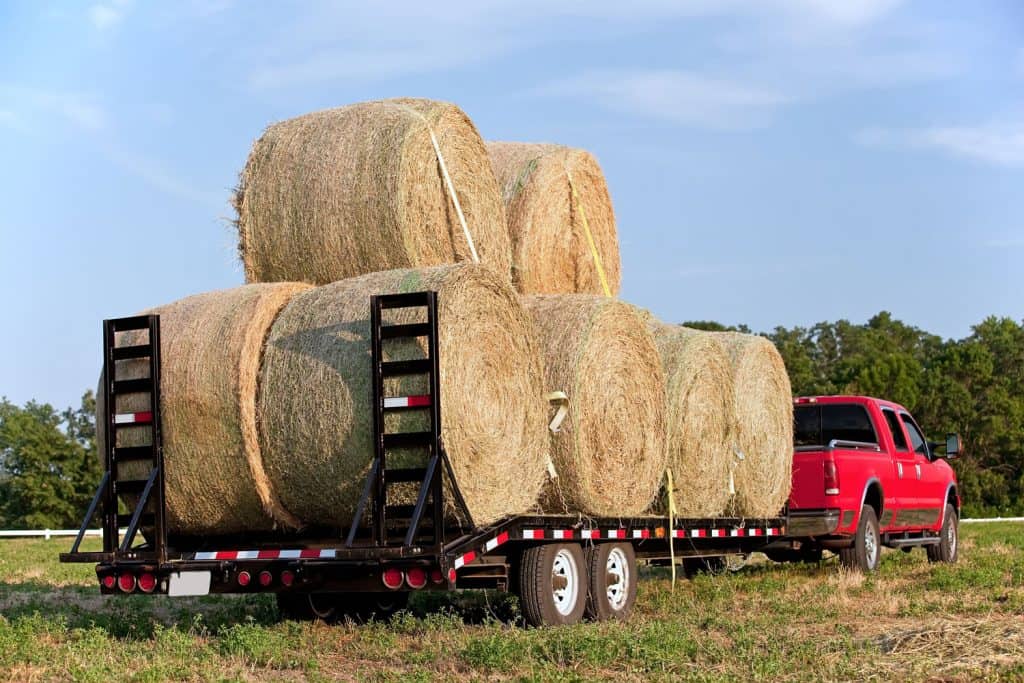Maybe you own a Chevy Colorado and think of buying a camper, or maybe you need a new truck to haul your camper with? Knowing what you can haul with your truck is essential to the safety of your truck, camper, and passengers. Luckily for you, we have done the research and have the answers you need to equip the Colorado for a camper or 5th wheel.
The Chevy Colorado has the ability to tow up to a 7,700-pound camper, depending on the year of the truck and the engine type. A Chevy Colorado will need to be fitted with a special 5th wheel hitch system to tow a 5th wheel. Towing a 5th wheel is not recommended because the average weight is between 11,000 and 20,0000 pounds, which exceeds Colorado's towing capacity.
Keep on reading to learn more about towing with a Chevy Colorado's towing capacity. We'll also discuss hitch classes, how towing affects your vehicle, automated safety hitches, and how to increase your towing capacity.

Towing a camper with a Chevy Colorado
Being able to tow a camper with a Chevy Colorado depends on your answers to two main questions:
What is your truck's tow capacity?
Although most Chevy Colorado trucks should easily be able to tow a small or medium camper, not each truck's version has the same capabilities. The baseline model can tow up to 3,500 pounds, while a fully-loaded Colorado can tow up to 7,700 pounds. Always check your owner's manual to see exactly how much your truck can tow. If your truck isn't up to the job, upgrading your truck's systems can help reach your desired towing capacity.
What is the weight of the camper or RV?
You should always know the weight of your load before towing. Checking your camper's manual will give you the dry weight of the camper. But, you should never tow based on just the dry weight. Your belongings, passengers, food, water, and waste will all add to the weight of your load. Make sure the whole load's weight does not exceed your truck's towing capacity.
Because 5th wheels are so heavy, it's not suggested to haul one with a Chevy Colorado. Most 5th wheels start at a weight of 11,000 pounds. Even with upgrades to the truck, this still may be too heavy for the truck to haul.

What does hitch class mean?
A hitch for your vehicle is essential for towing a camper or trailer. But hitches are not all built the same. They come in different sizes, strengths, and fittings. Tow hitches are divided into classes. These classes designate the hitch's opening size and tow weight capacity. Below we'll go over the different classes, their gross trailer weight (GTW), and their receiver opening size.

Class 1
A Class 1 hitch is a lightweight hitch and is most often used with small cars and SUVs. These hitches are great for towing a small bike rack, kayaks, scooters, and cargo carriers. These hitches do not have the capacity to tow an RV or a camper.
- GTW: 1,000 to 2,000-lbs.
- Receiver Opening: 1- 1/4"
Class 2
Class 2 hitches are a little tougher than the Class 1 hitches. Like the Class 1, these hitches are typically used for cars and SUVs. Although they have the same receiver opening size, hitch accessories cannot be used on Class 1 hitches. These hitches have the tow strength to haul bikes, cargo carriers, kayaks, scooters, small trailers, small boats, and small pop-up campers.
- GTW: 2,000 to 3,500-lbs.
- Receiver Opening: 1- 1/4"
Class 3
As one of the most common classes of hitches, Class 3 hitches possess a wide range of weight capabilities. These hitches are often used with large SUVs and trucks. Class 1 or 2 accessories can be used on a Class 3 hitch with an adapter. They have the capability to tow bikes, snowmobiles, kayaks, medium-sized boats, utility trailers, and midsized campers.
- GTW: 3,500 to 8,000-lbs.
- Receiver Opening: 2"
Class 4
Class 4 hitches have a hefty weight capacity, being able to tow up to 12,000 pounds. These hitches are often used with heavy-duty trucks. These hitches have the capability to tow large boats, horse trailers, toy haulers, and large RVs.
- GTW: 5,000 to 12,000-lbs.
- Receiver Opening: 2"
Class 5
Class 5 hitches are the biggest hitches around and come in three sizes. These hitches can only be used by heavy-duty and commercial trucks. With the ability to tow horse trailers, multi-car trailers, large RVs, and toy haulers, Class 5 hitches are the toughest around. Adapters can be bought if you need to connect a lower class accessory to a Class 5 hitch.
- GTW: 10,000 to 25,000-lbs.
- Receiver Opening: 2", 2-1'2", or 3"
Does towing hurt your truck?
Besides the general wear and tear you may put on your truck, towing within your truck's tow capacity is generally safe for the vehicle. But if you go over the towing capacity, you open up a world of potential problems.
Exceeding your towing capacity could create issues for your engine. An overheated engine could cause serious internal problems for your truck. This can also create issues by overheated brakes and putting too much strain on your truck's frame.
Additionally, hauling over your vehicle's weight capacity can potentially cause accidents from less braking time and inability to control the load through a turn.

Does Chevy Colorado have Tow/Haul Mode?
Tow/haul mode is designed to make towing easier for the driver. This mode changes the shift cycles of your transmission and lets your transmission shift a little sooner to compensate for extra weight. This helps prevent wear and tear on your engine. Tow/haul mode also gives the driver extra brake time. Any new Chevy Colorado is fitted with this helpful tool.
What is an automated safety hitch?
An automated safety hitch is designed for use with a 5th wheel or any other type of goose-neck trailer. The safety hitch looks like a tow dolly with the goose-neck hitch attachment. The system provides improved stability and braking.
The automated safety hitch attaches to a typical receiver hitch on your truck. The hitch connection moves vertically when driving on uneven ground. This provides a form of independent suspension. Horizontal movement is limited, providing added stability when hauling.
It also creates a longer wheelbase. Having a longer wheelbase adds stability and allows for safer towing. Since the 5th wheel is towed past the end of the truck, the longer wheelbase allows for a tighter turning radius. The automated safety hitch contains a steerable axle, which helps assist the longer wheelbase.
Can you increase a vehicle's towing capacity?
If your vehicle isn't quite up to the task of hauling your camper or RV, there are a few things you can do to increase your towing capacity. Below, we'll go over a few upgrades that can be made to make your towing/hauling experience a bit easier.
Install a power programmer
A power programmer is a high-tech piece of equipment that plugs into your vehicle's computer. The system adjusts the computer settings and gives you the ability to increase your vehicle's horsepower and torque, in return giving you more towing capability. Although this will give your vehicle more power, you may lose a bit in fuel efficiency.
Check out power programmers on Amazon.
Upgrading your axles
Overloading your axles can be extremely dangerous. Although expensive, upgrading your axles would greatly increase your towing capabilities. By upgrading your axles and differentials, your vehicle will have an enhanced gear ratio, allowing you to tow heavier loads. RV axles are made to hold heavy-weight and are a great option for most trucks.
A bigger radiator
Your radiator is essential for keeping your engine and transmission cool. Installing a bigger radiator will help keep your engine from overheating when hauling heavier loads. Combining this with top-rated lubricants, engine oil, and transmission fluids will help disperse the heat.
Upgrading your brake system
When towing and hauling, your brake system takes a beating. Part of towing capacity is being able to stop when needed. By upgrading to top-notch brakes, you'll be able to slow down and stop better. Upgrading with an electronic braking system will also help slowing down and braking easier when hauling heavy loads.
Intake and exhaust systems
Just like you, your vehicle's engine needs to breathe. By upgrading your intake and exhaust system, your engine will be able to breathe better. Thus it will perform better. With an enhanced exhaust system and upgraded air filters, your vehicle's horsepower will improve. To obtain better results, a dual exhaust system is suggested.
Upgrade your suspension system
Although costly, installing heavy-duty springs is worth the money and will help keep your truck level while towing. Upgrading your suspension system will drastically improve your vehicle's handling and stabilize the load by reducing swaying.
A proper hitch
Like we discussed earlier, having the proper class hitch is essential in towing and hauling. Upgrading your hitch to make sure it can do the job will help increase your towing capabilities.
Summary
The Chevy Colorado is a great truck with a lot of power. When it comes to towing, Colorado can pull up to 7,700-pounds. With a proper hitch class and some system upgrades, you can increase the towing capacity with any vehicle. Always check your towing capacity and the weight of the load before towing. If you tow more than your truck can handle, you could be in for some brutal vehicle repairs.
Thanks for reading! And before you go, make sure to check out these other great articles:
Truck Camper Vs. Class B Van: Which is better for you?
How Much Can You Tow With a Ford Ranger? [With or without a towing package]
Can a Chevy Silverado Be Flat Towed? Here’s What Truck Owners Need to Know

